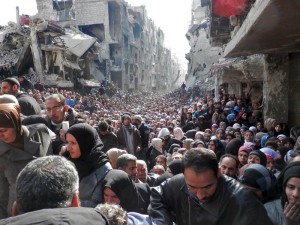
Yesterday I wrote a blog for the Huffington Post about what it means to respond as Christians to the plight of Syrian refugees.
This week, I’ve continued to read news stories about the refugee crisis–a crisis which had been unfolding for quite sometime before the Syrian civil war produced enough refugees and enough shocking images at one time to awaken our collective conscience. I attended a town hall meeting here in Vancouver last Tuesday where I learned that despite that bloody civil war and the expanding empire of ISIL, the vast majority of the world’s refugees still come from Africa rather than the Middle East. At Kinbrace, I’ve also spent time talking with refugees and refugee claimants from Ethiopia, Nepal, Iran, Afghanistan, and other countries, and their stories remind me that even in places that don’t make the headlines, millions of people fear for their lives every day because of oppressive government regimes and armed conflict.
These stories fill me with sadness, but also with frustration and anger over the way that many of us in the West have allowed fear to prevent us from extending compassion to those who are in urgent need of our help. Hungary has now closed its borders to Syrians fleeing the conflict, and the government is arresting those who deem an illegal crossing their best bet for survival. Refugees continue to drown in the Mediterranean as “Fortress Europe” deliberately refuses to help as a matter of official policy, in order to deter further immigration. But those who are desperate enough to risk the lives of themselves and their children on the rag-tag dinghies of human smugglers will not be deterred from making these deadly voyages, because they clearly have no choice. These journeys are their last hope: either they risk losing their lives, or lose them for sure by staying where they are.
Many in Europe are afraid that the influx of Muslims will threaten the “Christian identity” of Europe, but as Giles Fraser so starkly pointed out in an article for the Guardian newspaper on September 4, the Christian identity of Europe is threatened not by Muslims, but by Christian politicians who refuse to live out the Biblical mandate to welcome the stranger and care for the oppressed.
And what about North America? Canada welcomed 19,233 government assisted refugees in 1980, but that number has plummeted to just 6,900 in 2015. Furthermore, despite the government’s promise to accept 10,000 Syrian refugees over 3 years, Canada has settled just over 1,000 Syrians so far. Meanwhile, the United States has taken in fewer than 1,000. So far, we North Americans haven’t shown ourselves to be any more hospitable than Europe.
Another security concern that has been raised is the possibility of terrorists slipping in amongst the flood of legitimate refugees seeking asylum. Security experts have already addressed the unlikelihood of this happening. Yet few people have talked about the way that welcoming refugees from Muslim countries actually offers our nations an opportunity to address the root causes of terrorism: poverty, lack of opportunity, traumatization and loss of loved ones in conflict zones, and hatred of the West due to foreign policy and military interventions which negatively impact Muslim civilians in the Middle East. This is a chance to show genuine love and concern to our Muslim neighbors, and to provide a secure future for exactly the kind of children who might otherwise be at risk for radicalization by opportunistic terrorist organizations who prey upon those who are impoverished and discontented.
As citizens of a world increasingly interconnected by economic ties, military involvement, and technology, the refugee crisis is not some distant issue from which we can pretend to be entirely separate. The current situation forces us to confront our political and military contribution to the crisis, and challenges those of us who follow Jesus to live out some of the core tenets of our faith.


